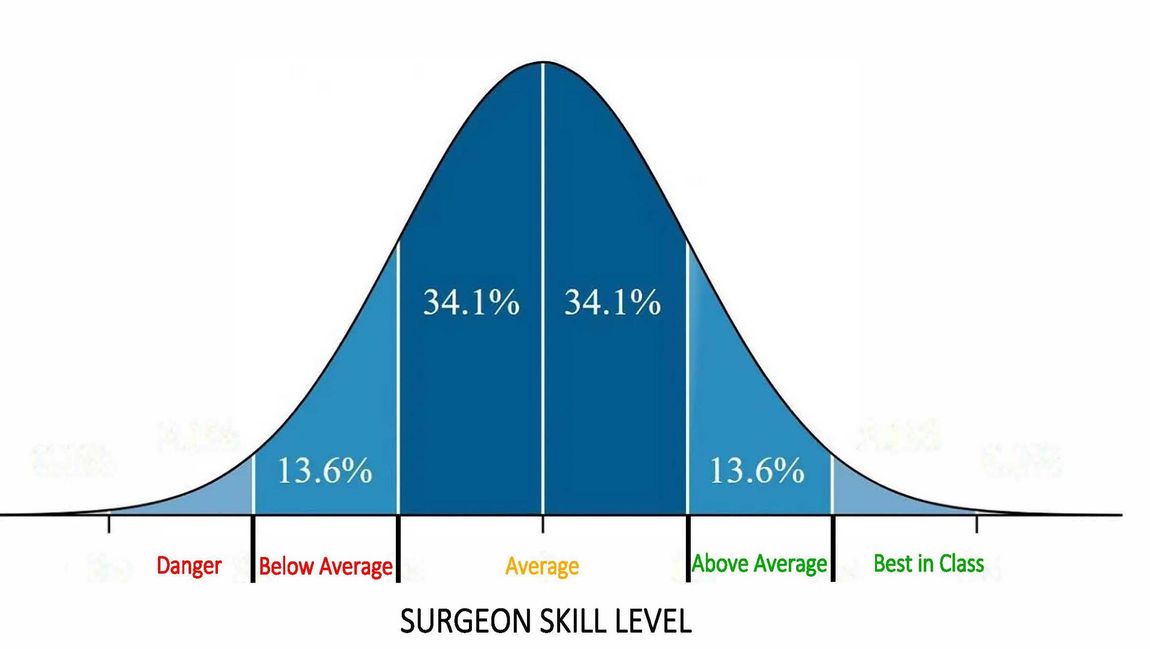The Best Surgeons
Surgeons are NOT created Equal
The bell-shaped curve is a common feature of nature. If we randomly sampled 100 surgeons, we would expect to see a normal distribution frequency curve for many continuous variables, such as IQ, height, weight, blood pressure and.... surgical skill level.

You want the best surgical outcomes for yourself and your loved ones. The most skilled surgeons give you the best probability of achieving such an outcome.
Surgeon Researcher provides you access to our network of Surgical Sources to ensure your surgeon falls into the right tail of the standard distribution of surgeon skills.
Studies on the Importance of Surgeon Skill
Variation in Surgeon Proficiency Scores and Association With Digit Replantation Outcomes
Alfred P Yoon , Robert L Kane , Leyi Wang, Lu Wang, Kevin C Chung
Objective: To assess the variation of surgeons' operative proficiency and investigate its association with surgical outcomes.
Conclusions and relevance: Operative proficiency varied widely among practicing surgeons and accounted for 17% of estimative ability for success of digit replantation and revascularization. Greater surgeon proficiency was associated with better outcomes, indicating that the value of surgical care may be optimized by improving surgeon proficiency.
Journal of the American Medical Association
Surgeon Factors Have a Larger Effect on Vascular Access Type and Outcomes than Patient Factors
Timothy P Copeland, Peter F Lawrence, Karen Woo
Objectives: Though patient factors are frequently linked to hemodialysis vascular access selection and outcomes, variability by surgeon and surgeon specialty may play a role as well. The objective of this study is to examine the extent to which individual surgeons influence selection of vascular access type, removal of tunneled hemodialysis catheter (THC), and repeat vascular access.
Conclusion: Individual surgeons are associated with greater variation in vascular access type and likelihood of repeat access than surgeon specialty and measurable patient demographics/co-morbidities. Future research should focus on identifying which surgeon factors are associated with improved outcomes.
Journal of Surgical Research
It is time to look in the mirror: Individual surgeon outcomes after emergent trauma laparotomy
Parker Hu, Jan O Jansen, Rindi Uhlich, Zain G Hashmi, Rondi B Gelbard, Jeffrey Kerby, Daniel Cox, John B Holcomb
Background: Multiple quality indicators are used by trauma programs to decrease variation and improve outcomes. However, little if any provider level outcomes related to surgical procedures are reviewed. Emergent trauma laparotomy (ETL) is arguably the signature case that trauma surgeons perform on a regular basis, but few data exist to facilitate benchmarking of individual surgeon outcomes. As part of our comprehensive performance improvement program, we examined outcomes by surgeon for those who routinely perform ETL.
Conclusion: Significant differences exist in outcomes by surgeon after ETL. Benchmarking surgeon level performance is a necessary natural progression of quality assurance programs for individual trauma centers. Additional data from multiple centers will be vital to allow for development of more granular quality metrics to foster introspective case review and quality improvement.
Journal of Trauma and Acute Care Surgery

Surgeon Research
Who is Cutting into You?
- Insider Review of Your Surgeon
- Access to Opinions of Medical Professionals
- Surgeon Skill Level Assessment
- Surgical Technique and Technology Assessment
- Comparison of Your Surgeon with other Surgeons in Your Area
- Surgeon Recommendation

